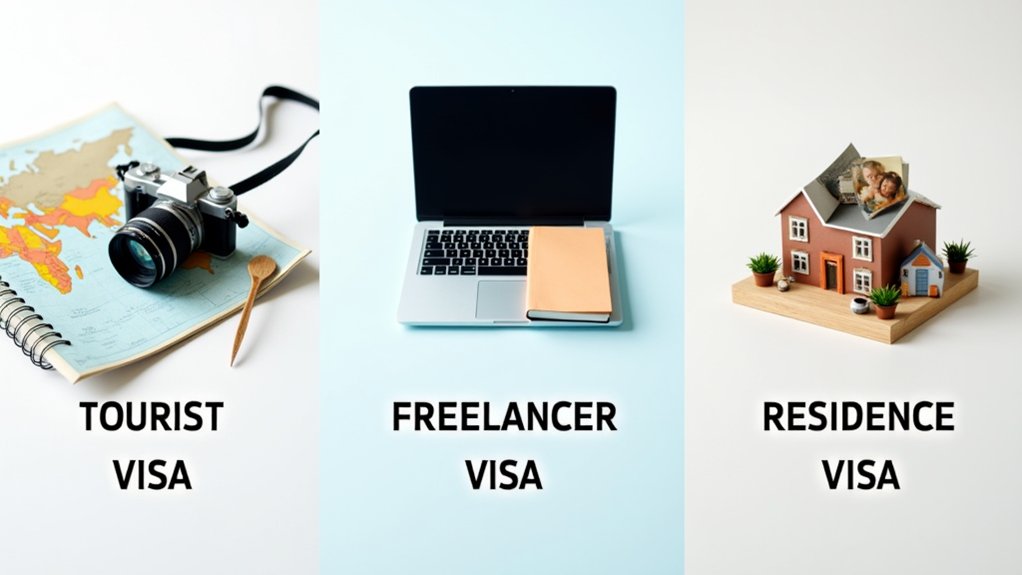When comparing tourist, freelancer, and residence visas, each serves distinct purposes and durations. A tourist visa, typically valid for 30 to 90 days, permits leisure travel without work privileges. In contrast, a freelancer visa, ranging from 1 to 3 years, enables independent work with multiple clients, requiring proof of income and family sponsorship. Meanwhile, a residence visa offers long-term residency from 1 to 10 years, permitting work and access to essential services, also allowing family sponsorship. Understanding these differences helps you select the most suitable visa for your objectives, revealing various lifestyle and professional pathways you may explore ahead.
Overview of Visa Types
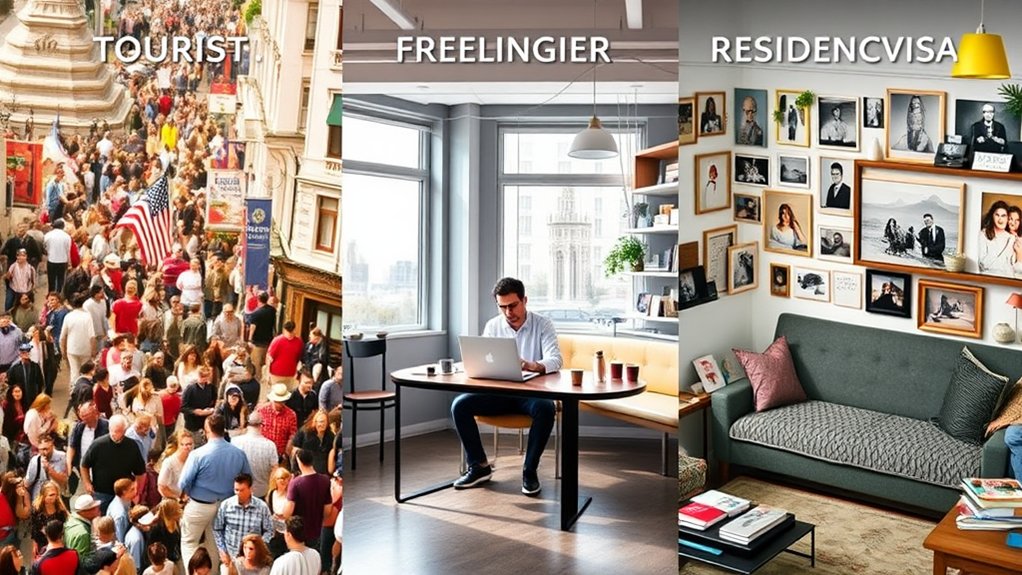
When considering a visit or stay in the UAE, it's important to understand the different types of visas available. The Tourist Visa serves individuals seeking short-term leisure, typically valid for 30 to 90 days, with specific application requirements like proof of accommodation. For independent professionals, the Freelancer Visa allows you to work legally, engaging with global clients, contingent upon providing evidence of freelance income and qualifications. Meanwhile, the Residence Visa is designed for those aiming for long-term residency, permitting expatriates to live and work in the UAE for durations ranging from one to ten years, often renewable. Each visa type has distinct application requirements that reflect its purpose, accommodating varying needs and professional aspirations.
Tourist Visa Explained
If you're planning a short getaway to the UAE, understanding the Tourist Visa is essential. This visa facilitates short-term visits for leisure, family, or tourism, typically valid for 30 to 90 days, contingent upon your nationality. Importantly, the Tourist Visa prohibits any work or business activities, ensuring your focus remains on exploration. For those eligible, a visa on arrival is available, allowing entry without prior application for 30 to 60 days. The application process can be efficiently completed online or through accredited entities, requiring a valid passport and supporting documentation. Additionally, you can extend your stay for an additional fee, making the Tourist Visa an ideal choice for immersing yourself in the vibrant culture and attractions of the UAE.
Purpose of Tourist Visa
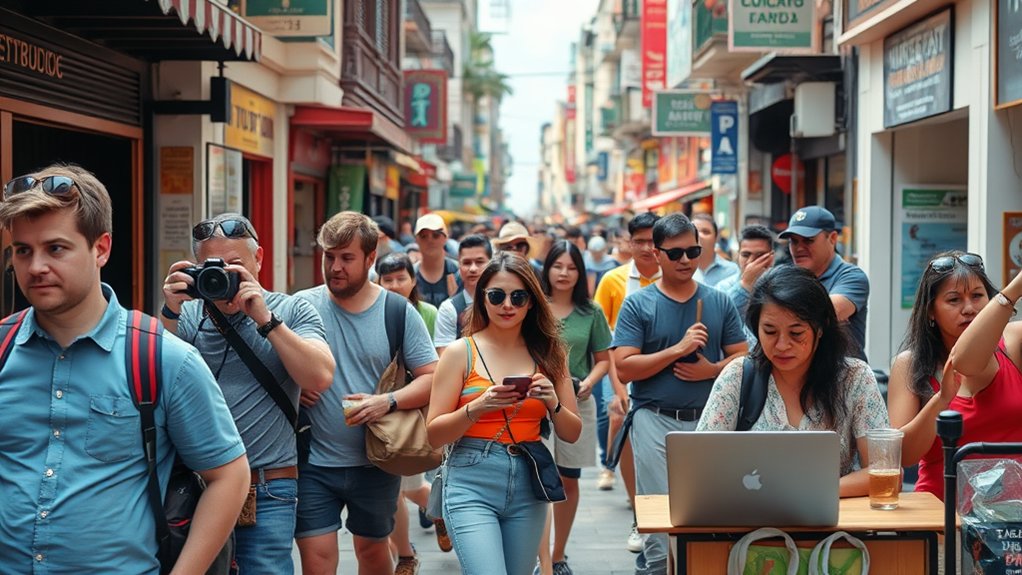
The Tourist Visa serves a specific purpose, granting you a short-term stay in the UAE for leisure, family visits, or tourism. Typically valid for 30 to 90 days, depending on your nationality, this visa allows you to immerse yourself in the rich cultural and recreational offerings of the region, although it strictly prohibits any work or business activities. To obtain this visa, you can navigate through various application channels, including online platforms and sponsorship options through residents or hotels, ensuring a straightforward process for your travel plans.
Duration of Stay
While exploring the UAE's vibrant culture and stunning landscapes, you'll find that a tourist visa typically allows you to stay for 30 to 90 days, depending on your nationality. This visa is primarily intended for leisure activities, tourism, or visiting family and friends, and it does not grant any employment rights. With a visa validity of 60 days from the issuance date, it is crucial to enter the UAE within this timeframe. For those wishing to extend their adventure, a tourist visa can often be extended for an additional 30 days. Unlike a freelance visa or residence visa, the tourist visa strictly prohibits any work or business activities, emphasizing its role as a temporary solution for exploration rather than employment.
Activities Allowed
When visiting the UAE on a Tourist Visa, you can immerse yourself in a variety of activities designed for leisure and enjoyment. The activities permitted under this visa include sightseeing, attending cultural events, visiting family and friends, and engaging in recreational pursuits. However, it's important to emphasize that holders of a Tourist Visa are prohibited from working in the UAE or conducting any business activities, distinguishing this visa from the Freelancer Visa or Residence Visa. In addition, a Tourist Visa does not confer residency status or allow you to sponsor dependents for residency in the UAE. Should you wish to extend your stay, you may do so, subject to specific regulations and fees established by UAE authorities.
Application Process
Applying for a tourist visa to the UAE is a straightforward process that can often be completed online or through an accredited travel agency. To initiate your application, you'll need to gather required documents, such as a valid passport and passport-sized photographs. Depending on your nationality, tourist visas are typically issued for short stays of 30 to 90 days. Additionally, proof of accommodation arrangements, a return flight ticket, and sometimes a travel itinerary may be necessary. The processing time for tourist visas generally spans between 3 to 5 working days, although this can vary based on your country of origin. It is important to note that tourist visas prohibit any form of employment or business activities during your stay.
Key Features of Tourist Visa
When considering a tourist visa, it is crucial to understand the specifics regarding its duration and application process. Generally, these visas allow for stays ranging from 30 to 90 days, depending on your nationality, and they typically do not permit employment or business activities. The application can often be conveniently completed online or through travel agencies, ensuring that the process remains accessible for your travel plans.
Visa Duration and Validity
Understanding the duration and validity of a tourist visa is essential for anyone planning a trip to the UAE. The tourist visa typically ranges from 30 to 90 days, influenced by your nationality and the specific visa types issued. Here are key aspects to evaluate:
- Tourist visas can be extended for an additional 30 days, enabling longer stays.
- Most visas are single-entry; you must exit the UAE once your visa expires unless an extension is granted.
- Activation of your tourist visa must occur within 60 days of issuance, and your passport should remain valid for at least six months.
Be mindful of overstay penalties, which impose fines for unauthorized stays beyond your visa's validity, unlike a freelance visa or residency visa.
Application Process Overview
Maneuvering the application process for a tourist visa can be straightforward if you know what to expect. To apply, submit an online application to a UAE embassy or through an airline, including essential documents like a valid passport and passport-sized photos. The UAE government typically processes tourist visa applications within 3-5 working days, although this timeframe can vary based on individual circumstances. Depending on your nationality, you might qualify for a visa on arrival, allowing entry without prior application for 30-60 days. Remember to provide proof of income and return flight tickets as part of your application. Unlike freelancer or residence visas, the tourist visa offers varied durations, commonly 30, 60, or 90 days, with potential extensions available for a fee.
Eligibility for Tourist Visa

A tourist visa is designed for those looking to explore the UAE for leisure or family visits, and you'll typically need to meet specific eligibility criteria to obtain one. To qualify, consider the following:
- Valid Passport: Your passport must have at least 6 months of remaining validity and proof of onward travel.
- Financial Stability: Authorities may assess your financial stability, necessitating proof of sufficient funds to cover your stay.
- Proof of Accommodation: You must provide documentation of your accommodation arrangements during your visit.
Additionally, visitors from over 50 countries can benefit from visa-on-arrival options, further simplifying the entry process into the UAE. Meeting these eligibility criteria is essential for a smooth and successful application for your tourist visa.
Freelancer Visa Overview
The Freelancer Visa in the UAE offers you the opportunity to work independently while enjoying legal residency for one to three years, with the possibility of renewal. To qualify, you'll need a valid bachelor's degree, at least two years of freelance experience, and a minimum income of AED 360,000 over the past two years. As we explore the eligibility requirements, application process, and benefits associated with this visa, you'll gain a clearer understanding of how it can enhance your professional endeavors in a dynamic market.
Eligibility Requirements Explained
Maneuvering the requirements for a Freelance Visa in the UAE can seem intimidating, but understanding the eligibility criteria makes the process manageable. To qualify for a Freelance Visa in Dubai, you need to meet specific eligibility requirements:
- Be at least 18 years old and possess a valid passport with six months of validity remaining.
- Hold a minimum educational qualification of a bachelor's degree or a specialist diploma.
- Provide proof of financial stability, either through self-employment income totaling AED 360,000 over two years or by obtaining necessary freelance permits from the Ministry of Human Resources.
These criteria guarantee that you not only adhere to residency permits but also demonstrate your capability to thrive in the UAE's dynamic freelance landscape. Additionally, engaging with experienced business setup services can provide valuable insights and assistance throughout the application process.
Application Process Steps
To successfully navigate the application process for a Freelance Visa, you'll need to follow several essential steps tailored to your professional needs. First, select the appropriate visa type and gather the required documents, including your passport, educational qualifications, and proof of income. You'll then submit your application to the relevant free zone authority or the Ministry of Human Resources and Emiratisation (MoHRE). Completing a medical fitness test is also necessary. If you're applying through a free zone, securing a freelance permit is essential, while mainland applicants may need a No Objection Certificate (NOC) if employed. Remember, the application must be activated within 180 days of issuance, so timely action is critical for success. Utilizing PRO services can significantly simplify this entire process by ensuring compliance with local laws and regulations.
Benefits of Freelance Visa
Freelancing in the UAE opens up a world of opportunities, thanks to the numerous benefits provided by the Freelance Visa. This visa grants you legal residence for 1-3 years and is renewable, allowing you to work remotely while engaging in various freelance activities. Here are three key benefits:
- Flexibility: You can work with multiple clients across different sectors, enhancing your professional growth.
- Family Sponsorship: You can sponsor your family members for residency, creating a stable home environment.
- Tax Advantages: Enjoy the perk of no personal income tax, maximizing your earnings and financial stability.
With a straightforward application process, obtaining a Freelance Visa positions you for success in the dynamic UAE market. Additionally, the UAE's business-friendly environment fosters an ideal landscape for freelancers to thrive.
Purpose of Freelancer Visa

The Freelancer Visa serves an essential purpose for independent professionals looking to establish themselves in the UAE. This visa provides legal residency for periods ranging from one to three years, allowing freelancers to work independently without the need for a local sponsor. It opens doors across various sectors such as tech, media, and design, enabling you to engage with global clients. To qualify, you must demonstrate a minimum freelance income of AED 360,000 over two years and possess a valid bachelor's degree or equivalent, along with two years of freelance experience. Additionally, the Freelancer Visa allows you to sponsor family members, enhancing the appeal of living and working in the UAE while fostering a stable environment for both your career and loved ones.
Key Features of Freelancer Visa
A Freelancer Visa in the UAE offers several key features that make it an attractive option for independent professionals. This visa provides legal residency for 1-3 years, renewable upon expiration, allowing you to engage in freelance work across various sectors. Here are three notable features:
- Work Flexibility: You can work with multiple clients and projects, enhancing your professional portfolio.
- Tax Advantages: Enjoy no personal income tax, making your earnings more substantial.
- Family Sponsorship: You can sponsor family members for residency, creating stability in your personal life.
The application process typically takes 2-4 weeks and requires documents like a passport copy, photos, and proof of work experience, ensuring you obtain your freelance work permit smoothly.
Eligibility for Freelancer Visa

To qualify for a Freelancer Visa, you need to meet specific criteria that demonstrate your ability to work independently in the UAE. First, you must be at least 18 years old and possess a valid passport with at least six months of validity remaining. Additionally, you'll need a bachelor's degree or an equivalent educational qualification. Your eligibility hinges on demonstrating at least two years of freelance experience, coupled with proof of self-employment income, typically amounting to a minimum of AED 360,000 over two years. Importantly, there's no local sponsor required, which allows you the freedom to operate as an independent professional across the UAE, enhancing your opportunities in the thriving market.
Residence Visa Overview
When considering a Residence Visa in the UAE, it is crucial to understand the various types available and the application process involved. These visas cater to expatriates seeking long-term residency, and the requirements often hinge on employment, investment, or family sponsorship. By grasping these aspects, you can navigate the complexities of establishing legal residency and access the multitude of opportunities the UAE has to offer.
Types of Residence Visas
Understanding the different types of residence visas is essential for anyone looking to live and work in Dubai. Each visa category caters to specific needs and eligibility requirements:
- Green Visa: Designed for freelancers and self-employed individuals, this visa allows you to live in Dubai for up to five years without employer sponsorship, enhancing your flexibility.
- Golden Visa: This option grants long-term residency for up to ten years to foreign nationals who meet specific qualifications, such as investors or exceptional talents, enabling you to live, work, and conduct business in the UAE.
- Family Sponsorship Visa: This visa permits residents to sponsor their dependents, ensuring family unity while residing in Dubai.
Eligibility for any residence visa typically involves proving employment, investment, or educational status along with meeting financial criteria.
Application Process Overview
Applying for a residence visa in Dubai requires careful attention to several key steps to guarantee a smooth process. First, you'll need to gather essential documents, including a valid employment contract or proof of investment, a passport with at least six months of validity, medical fitness results, and a police clearance certificate. The application process also involves completing a designated application form, which you'll submit to the relevant authority. Typically, the processing time for a residence visa ranges from 2 to 4 weeks, depending on your circumstances. Residence visas can be valid for durations between 1 to 10 years, with renewal options based on employment or family sponsorship status, enabling you to sponsor family members for residency permits. Additionally, it is crucial to adhere to compliance with local laws to avoid any legal issues during your stay in the UAE.
Purpose of Residence Visa

The Residence Visa serves an essential role for expatriates in the UAE, allowing them to establish a long-term presence in the country. This visa is vital for enabling legal residency, offering various benefits that enhance your living experience. Here are three primary purposes of the Residence Visa:
- Long-term Stays: It permits durations ranging from 1 to 10 years, ensuring you can reside in the UAE without constant renewals.
- Sponsorship of Family Members: Eligible individuals can sponsor residency visas for their dependents, enabling family members to join you in the UAE.
- Access to Services: It provides access to essential services, including healthcare and education, contributing to a stable and fulfilling life in the region.
Key Features of Residence Visa
While exploring the key features of the Residence Visa, you'll find that it offers several advantages tailored to enhance your living experience in the UAE. To begin with, it grants you legal residency status, crucial for accessing services like banking and education. The Residence Visa is renewable, ensuring long-term stability, with durations ranging from 1 to 10 years, contingent on the specific visa type. To obtain it, you typically need proof of employment or financial stability, which can also include investments in UAE-based businesses. Additionally, as a holder of this visa, you have the ability to sponsor dependents, such as spouses and children, facilitating family unity while residing in the UAE. This visa therefore serves as an essential tool for expatriates.
Eligibility for Residence Visa
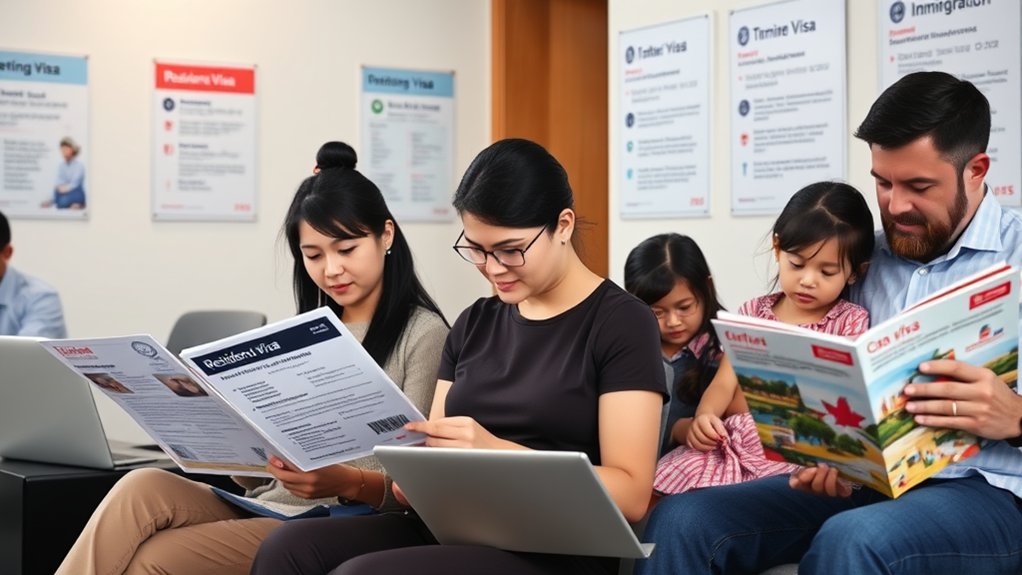
To qualify for a Residence Visa in the UAE, you need to meet specific criteria that guarantee you can contribute to the community. This eligibility for a residence visa hinges on several key factors:
- Employment or Education: You must possess a valid employment contract with a UAE company or be enrolled in a recognized educational institution.
- Financial Stability: Demonstrating financial stability is essential, often requiring proof of a minimum salary or investment amount.
- Background Checks: You'll need to pass a medical fitness test and provide a clear criminal background check.
Additionally, if you're a dependent of a UAE national or resident, you may qualify under the Family Sponsorship category, facilitating your application for the Residence Visa.
Comparing Visa Types
When considering your options for living and working in the UAE, understanding the differences between tourist, freelancer, and residence visas is essential. The Tourist Visa primarily caters to short-term leisure visits, typically valid for 30-90 days, without work privileges. In contrast, the Freelancer Visa allows you to work independently across various sectors for 1-3 years, requiring proof of freelance income and a bachelor's degree. The Residence Visa, on the other hand, offers long-term residency from 1 to 10 years, enabling you to live and work in the UAE, with options for family sponsorship. Consequently, when comparing visa types, consider their eligibility, purpose, and use to determine which aligns best with your aspirations in the UAE.
Benefits of Each Visa
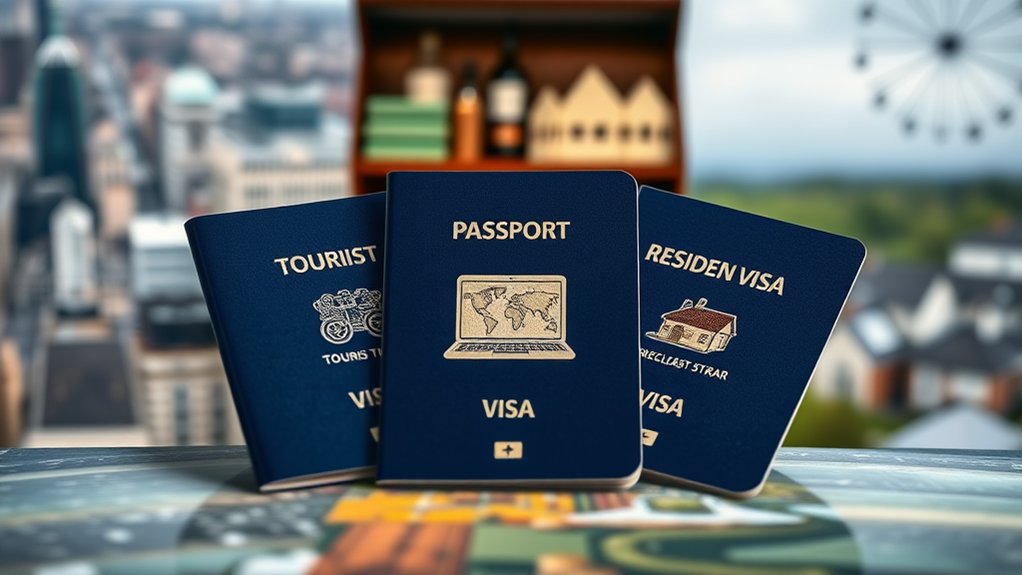
Each visa type comes with its own set of benefits tailored to different needs and circumstances.
- Tourist Visa: Ideal for short-term leisure or family visits, allowing you to explore cultural attractions without long-term commitments.
- Freelancer Visa: Offers legal residency, enabling you to work independently with global clients. It also provides tax advantages and allows for family sponsorship.
- Residence Visa: Grants long-term residency in the UAE, renewable for 1 to 10 years, facilitating access to essential services like healthcare and education while permitting multiple entries and exits.
Understanding these benefits can help you make informed decisions based on your specific circumstances and aspirations, ensuring that your choice aligns with your lifestyle and professional goals.
Choosing the Right Visa
How do you determine which visa is best for your needs? Choosing the right visa hinges on your intentions, duration of stay, and eligibility criteria. Tourist visas suit short-term leisure trips, while freelancer visas cater to independent professionals seeking to work in the UAE. Residence visas provide long-term options for expatriates wanting to live and work legally.
| Visa Type | Key Features |
|---|---|
| Tourist Visas | Short-term (30-90 days), minimal documentation required |
| Freelancer Visas | 1-3 years, proof of income and freelance experience needed |
| Residence Visas | 1-10 years, allows family sponsorship, more complex application process |
Evaluate these aspects carefully to guarantee compliance and optimize your experience in the UAE.
Frequently Asked Questions
What Is the Difference Between Freelance Visa and Work Visa in Dubai?
A freelance visa offers you flexibility, allowing multiple clients and simpler application processes. In contrast, a work visa imposes employment restrictions tied to one employer, with different visa requirements, tax implications, and visa durations.
What Is the Freelance Residence Visa in Dubai?
The freelance residence visa in Dubai requires valid qualifications and experience. You'll navigate the application process online, face potential challenges, consider tax implications, and assess cost comparisons. The visa's validity lasts 1-3 years, renewable.
What Is the Benefit of a UAE Freelance Visa?
With a UAE freelance visa, you enjoy numerous benefits: flexible working hours, cost savings through tax exemptions, and enhanced networking opportunities. These advantages empower you to thrive as a freelancer in a dynamic environment.
Can I Work Anywhere With a Freelance Visa in Dubai?
Yes, with a freelance visa, you can work anywhere in Dubai, enjoying flexible job opportunities. However, be aware of freelance visa restrictions, legal implications, and local taxation policies while working remotely to guarantee compliance with visa requirements.
Conclusion
In traversing the intricate landscape of visa options, understanding the distinctions among tourist, freelancer, and residence visas is essential for making informed decisions. Each visa category serves a unique purpose, tailored to specific needs and circumstances. By evaluating your objectives and eligibility, you can select the right visa that aligns with your aspirations, ensuring a seamless journey—whether for leisure, work, or long-term settlement. Armed with this knowledge, you're better equipped to initiate your international endeavors with confidence.

